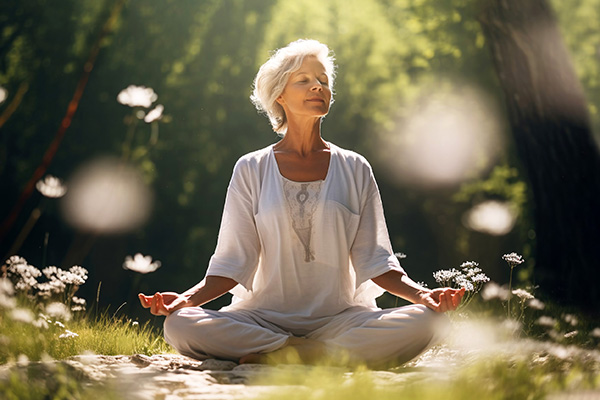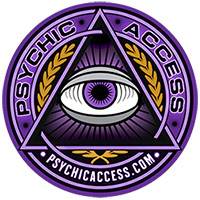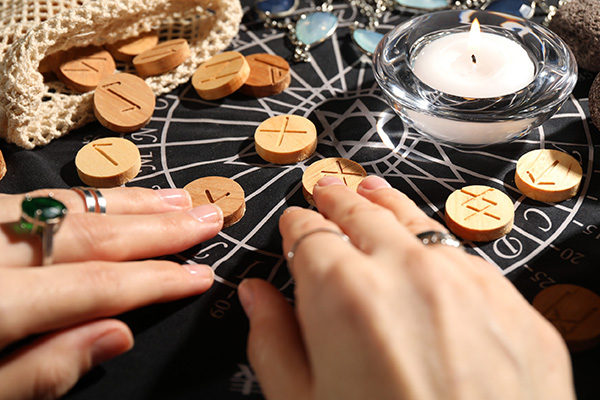Proven Techniques for Protecting Your Psychic Energy
 Psychic protection, which is also referred to as spiritual or energetic defense, is a practice I cherish as it aids in guarding me against negative energies, psychic assaults, and undue influences.
Psychic protection, which is also referred to as spiritual or energetic defense, is a practice I cherish as it aids in guarding me against negative energies, psychic assaults, and undue influences.
This idea isn’t new. Historical protective practices can be traced back to numerous ancient societies, indigenous customs, philosophies from the East, and esoteric traditions from the West.
In ancient Egypt, Greece, and Rome, people wore amulets and called upon protective deities to shield themselves from harmful energies and malevolent spirits. Native cultures in the Americas and Africa engaged in smudging and rituals to invoke ancestral spirits for safety.
Eastern spiritual traditions like Hinduism and Buddhism utilize mantras, yantras, and meditation for spiritual safeguarding. Kabbalistic practices highlight the importance of distinctive prayers and rituals to establish spiritual barriers. These methods reveal a profound belief in the influence of divine intervention and sacred symbols for protection.
In Catholicism, followers recite prayers like the Lord’s Prayer or St. Michael’s prayer to defend against malicious forces. They may also rely on holy water, crucifixes, or saint medals as symbols of protection. In Judaism, reciting Psalms and using amulets inscribed with Hebrew texts are prevalent practices for shielding against negative influences.
Modern spiritual communities have adopted these traditional practices to encompass the use of crystals, energy healing, and visualization approaches. Workshops, literature, and teachings provide a variety of techniques for psychic defense, all aimed at achieving a balanced, secure, and affirmative state of being. These varied traditions and contemporary adaptations highlight the universal spiritual necessity to shield ourselves from unseen detrimental energies and dark influences.
Energy is indeed contagious, both positive and negative. I will always be conscious of what and whom I allow into my environment ~ Alex Elle
It revolves around upholding our energetic boundaries to ensure mental, emotional, and spiritual wellness. As a professional psychic reader, practicing psychic protection is absolutely vital. Given my heightened sensitivity to energies, I frequently find myself exposed to a wide range of spiritual and emotional forces while working. Without adequate protection, I risk absorbing negative energies from my clients and the spiritual domain, which could result in emotional, mental, and physical depletion.
By practicing psychic protection, I uphold clear and robust energetic boundaries that secure my well-being and allow me to deliver accurate and effective readings. It also acts as a shield against potential psychic attacks or unwanted energetic disruptions, enabling me to operate with increased confidence and integrity.
I employ several strategies to sustain my psychic protection, ranging from straightforward visualization methods to more intricate rituals. One of the most straightforward psychic protection techniques I’m fond of is grounding. Grounding entails connecting with the Earth’s energy to foster a steady and balanced state. For instance, when I feel overwhelmed, I close my eyes and visualize roots extending from my feet deep into the earth, offering stability and drawing in positive energy.
I also enjoy walking barefoot in my garden. The sensation of cool grass beneath my feet and the Earth’s energy surrounding me assist in centering and protecting me. Gardening delivers a similar effect – there’s something incredibly grounding about having my hands in the soil.
Visualization methods are another key component of my psychic protection strategy. A widely-used technique I apply is white light visualization. I envision a radiant white light enveloping my body, forming a protective barrier that deflects negative energies. This technique is even more potent when I integrate affirmations. Silently repeating phrases like “I am safeguarded” or “I am surrounded by positive energy” amplifies the visualization. Occasionally, I visualize myself encased in an energetic bubble or adorned in armor tailored to my desire.
Psychic protection is about nurturing your energy (aura) to stay grounded and live your most intuitive life ~ Jessica Lee
Crystals also serve as a reliable option for psychic protection due to their energetic properties. My top choices are black tourmaline, amethyst, and clear quartz. Black tourmaline is particularly effective for absorbing negative energy and grounding. I often carry a piece with me or wear it as a pendant. Conversely, amethyst provides spiritual protection and heightened psychic awareness, making it ideal when I conduct readings. Clear quartz, often dubbed the master healer, is incredibly adaptable. I program it with specific protective intentions and position it throughout my home and workspace.
Regular cleansing rituals are another essential aspect of my psychic protection routine. Frequent cleansing helps eliminate any negative or stagnant energy from my aura and surroundings. I enjoy smudging with sage or other herbs, taking salt baths, and practicing sound healing with bells, chimes, or singing bowls. These rituals not only purify my environment but also elevate my vibrational state, keeping harmful energies at bay.
Establishing clear boundaries is another vital factor in upholding my energetic wellness. This involves being aware of the individuals, situations, and environments I engage with and learning to say no or create distance when necessary. Practicing assertiveness and self-care protects my energy from being drained by others, while focusing on self-awareness allows me to identify and manage energetic imbalances as needed.
Meditation and mindfulness practices are also critical in any psychic protection toolbox. These practices boost my ability to remain calm, centered, and focused, lowering my susceptibility to external influences. Regular meditation strengthens my aura and enhances my resistance to negative energies. Mindfulness keeps me present and conscious, making it easier to notice and address energetic disruptions.
In conclusion, psychic protection encapsulates a variety of techniques aimed at safeguarding our energetic health. Grounding, visualization, utilizing crystals, cleansing rituals, establishing boundaries, and practicing meditation are all beneficial tools I’ve adopted in my everyday life. These strategies have bolstered my resilience against negative energies and cultivated a consistent sense of inner peace and security. By integrating these practices into my lifestyle and work, I feel more balanced and shielded, prepared to tackle whatever challenges arise.
|
Known as The Psychic’s Psychic, since 1998, Isadora has provided readings for thousands around the globe, including clients from the Obama administration, Fortune 500 CEOs, and prominent figures in Hollywood. Her impressive accuracy is astounding, with the ability to perceive people at the Soul Level and precisely respond to inquiries on various subjects, from relationships and business decisions to past lives, etc.—anything that necessitates clear guidance and pinpoint insights. She can identify hidden patterns underlying your present circumstances, offering you insights to positively transform your future. If you are interested in a reading with this compassionate, straightforward, laser-accurate, and dedicated Psychic, you can find Isadora at PsychicAccess.com. |
Effective Strategies for Protecting Your Psychic Energy
In today’s fast-moving and tumultuous environment, it is vital to safeguard and preserve your psychic energy. Psychic energy signifies the life force flowing within us, influencing our thoughts, feelings, and overall wellness. Just as we implement measures to protect our physical health, it is equally important to prioritize our psychic energy. By doing so, we can improve our mental clarity, emotional stability, and spiritual development. In this article, we will delve into effective methods for safeguarding your psychic energy.
1. Grounding and Centering Techniques:
Fundamental practices for maintaining a balanced and stable energy field include grounding and centering techniques. Grounding facilitates a connection with the Earth’s energy, enabling the release of excess or negative energy. Activities such as walking barefoot on grass, gardening, or visualizing roots stretching from your feet into the Earth can accomplish this. Centering, conversely, focuses your awareness on your core, aligning your energy with your authentic self. Meditation, deep breathing exercises, and yoga are excellent grounding and centering practices.
2. Setting Boundaries:
Establishing healthy boundaries is essential for safeguarding your psychic energy. Boundaries create limits and protect you from energy vampires or people who deplete your energy. Identifying and communicating your needs is crucial; saying no when necessary and surrounding yourself with supportive and positive individuals is vital. Remember, prioritizing your well-being is not selfish; it is a vital act of self-care.
3. Cleansing and Clearing Rituals:
Similar to how we cleanse our physical bodies, it is equally important to purify our energetic bodies. Regularly clearing your energy field helps eliminate stagnant or negative energy that may have built up. Numerous energy cleansing methods exist, including smudging with sage or palo santo, using crystals, taking salt baths, or practicing visualization techniques. Find a cleansing method that resonates with you and incorporate it into your routine.
4. Mindful Consumption:
Mindfulness regarding what you consume, both physically and energetically, is imperative for safeguarding your psychic energy. Be conscious of the media, news, and conversations you engage in, as they can greatly influence your energy. Limit exposure to negative or toxic environments, favoring uplifting and positive influences instead. Additionally, nourishing your body with healthy foods, maintaining hydration, and obtaining adequate restful sleep can help sustain a balanced energy field.
5. Energy Protection Techniques:
Employing energy protection techniques can provide an added layer of defense against external influences. Visualizations, such as picturing yourself enveloped in a protective bubble of light or wearing an energetic shield, can guard your energy from negative or invasive forces. You may also opt for protective crystals like black tourmaline or amethyst, or wear protective symbols or talismans that resonate with you.
6. Self-Care Practices:
Engaging in regular self-care routines is essential for maintaining and replenishing your psychic energy. This may involve spending time in nature, pursuing hobbies that bring joy, journaling, mindfulness or meditation practices, and physical exercise. Prioritizing self-care enables you to recharge and restore your energy, ensuring you possess the resources to face daily challenges.
In summary, safeguarding your psychic energy is crucial for overall wellness and spiritual growth. By incorporating grounding and centering techniques, establishing boundaries, practicing cleansing rituals, being mindful of energetic consumption, utilizing energy protection tactics, and placing emphasis on self-care, you can create a resilient energy field. Remember that your psychic energy is a valuable resource, and by protecting it, you can enhance your mental, emotional, and spiritual vitality. Continue reading
















